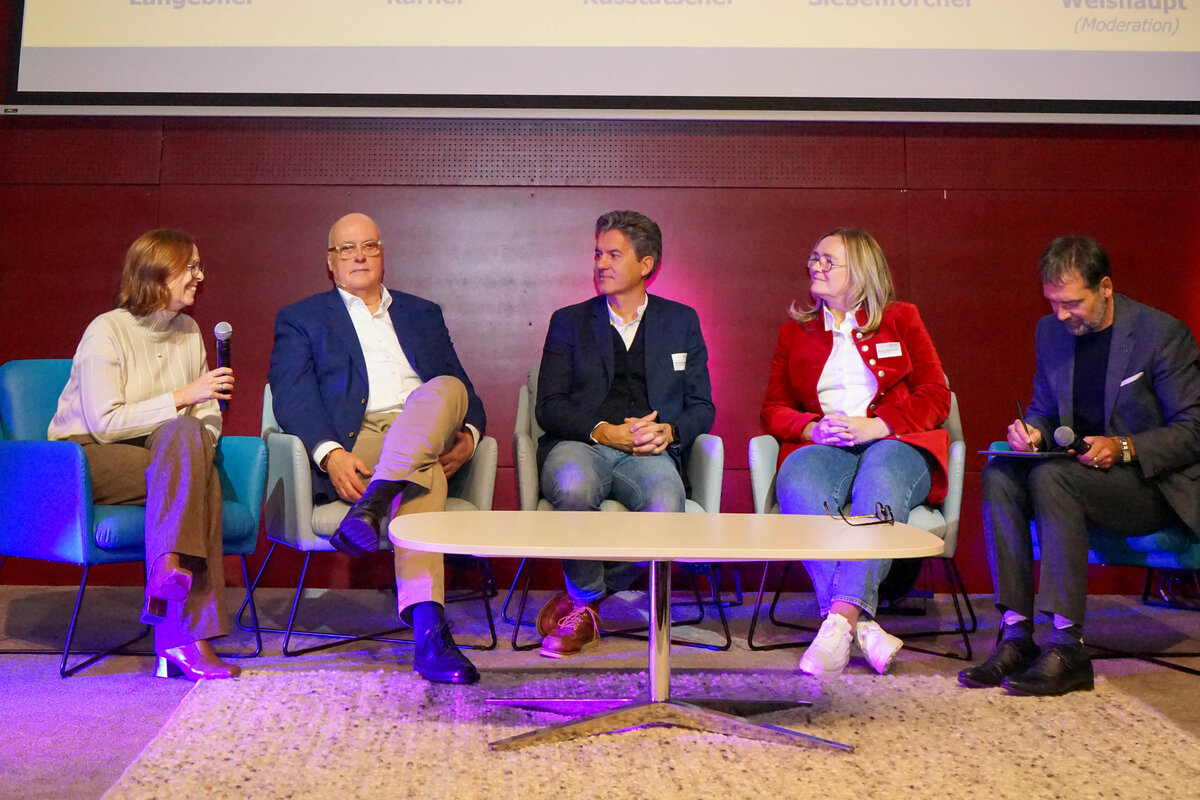“Toxic for the economy": plain speaking at Family Business Day
- 04.12.2024
- Event Review

High-level discussion: the fully occupied podium at the Family Business Day at the Kufstein Uni.
How can family businesses thrive in challenging times? Part 2 of the series on the Family Business Day at Kufstein University highlights the focus on sustainability, innovation, and the backbone of the economy: the SME sector.
After the insights into the challenges of family businesses in the first part of the series of articles for the 8th Family Business Day, the focus is now on specific practical examples and a straightforward presentation about medium-sized companies.
THE VALUE OF VALUE CHAINS
In her presentation, Barbara Siebenförcher, managing director of the South Tyrolean family-owned butcher shop Siebenförcher, explained the development of her company, which has transformed from a traditional butcher shop into a delicatessen specialist. Production capacity has increased enormously, with the amount of products sold rising from 350,000 kilograms to almost 5.5 million. Siebenförcher emphasized the importance of innovation, citing a success rate of almost 87 percent for new products in 2023 as an outstanding example. Particularly noteworthy was the strategy of producing many of the products in-house, which led to greater control over the value chain.
SUSTAINABLE WITH CONCRETE – IS THAT POSSIBLE?
Another example of successful market adaptation was provided by Werner Kusstatscher, managing director of Beton Eisack. Beton Eisack is the only company in Italy to produce insulating concrete with glass foam gravel. Kusstatscher explained how his company is playing a pioneering role in the region and beyond. He stated that 95 percent of the washing water is reused. Moreover, 85 percent of the materials used to manufacture the products are sourced locally. The switch to electricity-based heating systems, which replaces fossil energy sources, was a further step in the direction of sustainability. “Sustainable construction with concrete – is that possible?” was the question that Kusstatscher raised in his lecture and answered with specific figures and examples.
“A BOON FOR THE ECONOMY”
In the final lecture, entrepreneur, advisor and lecturer Reinhold M. Karner addressed the question of whether SMEs in Europe can survive in the long term. Karner stated that the conditions for medium-sized companies had increasingly deteriorated in recent decades. “Medium-sized companies are the robust backbone of the economy,” emphasized Karner. He was particularly critical of the current start-up culture and noted that the majority of these companies fail after a short time. “In my view, start-ups are toxic to the economy,” said Karner.
He was not referring to the idea of entrepreneurship itself, but to the way in which many startups are founded today. Karner criticized the fact that many founders go to market with the primary goal of “getting rich and famous quickly,” without sufficiently dealing with the long-term challenges of company management. Nevertheless, Karner emphasized that this is by no means a fundamental argument against startups. Rather, he criticized the approach and lack of practical orientation in founder training.
Karner called for practice-oriented training for entrepreneurs that focuses on the realities of the market. He saw the need to reduce bureaucracy, as this inhibits productivity. Karner pleaded for greater support for SMEs through targeted measures that would not hinder but rather promote them. According to Karner, the "golden middle class" is the key to a more stable and sustainable economy.
CONCLUDING PANEL DISCUSSION
The event was rounded off by a panel discussion in which Mag. Daniela Kapelari-Langebner, Barbara Siebenförcher, Werner Kusstatscher and Reinhold Karner took up central theses of their lectures. Under the moderation of Prof. (FH) Mag. Markus Weishaupt, success factors, challenges and the importance of sustainability for family businesses were discussed.
Links:
- Leadership & Business Management | VZ Bachelor's program
